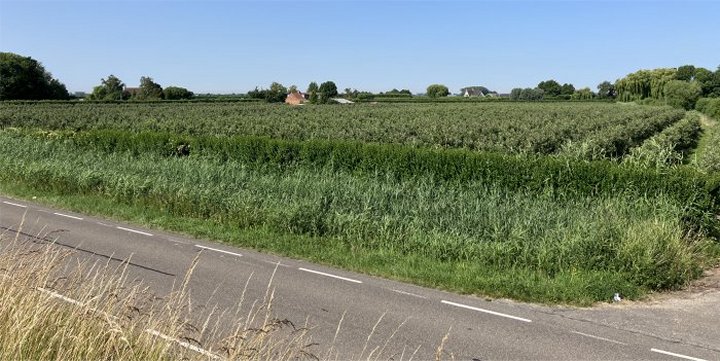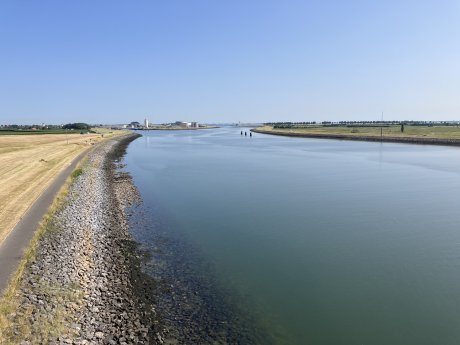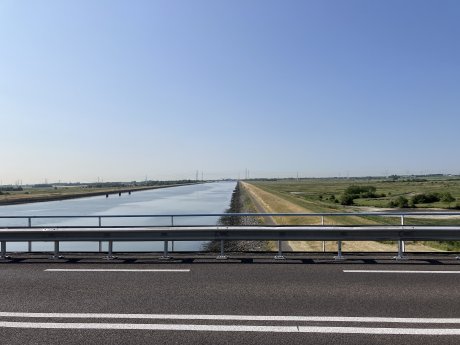On reaching Postweg, we crossed the canal via the Postbrug, the road then leading us past a huge area of fallow land criss-crossed by ditches where cattle grazed. A few large properties lined our route before we were eventually surrounded by arable land containing crops of sweet corn, potatoes and sugar beet. The heat was already becoming oppressive, and as we entered the outskirts of Yerseke, I spotted a sign indicating a temperature of 34 degrees.
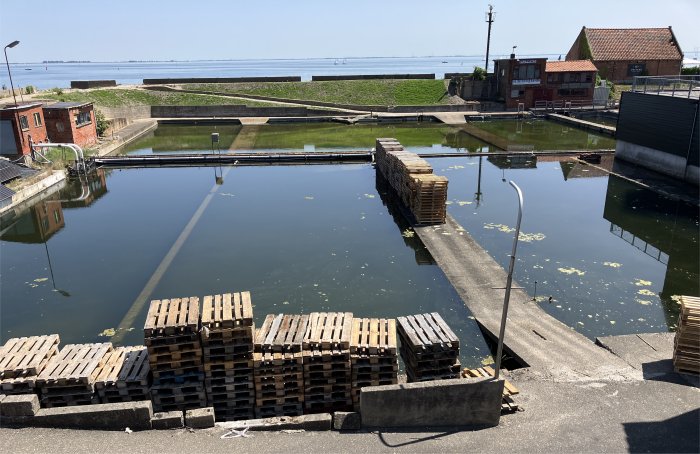
Oyster Ponds
|
I noted the architecture of the houses in Yerseke was different to that seen in Wemeldinge, perhaps slightly older with different brickwork, maybe reflecting the town's fishing port history.
Skeletal remains, found in Yerseke during an archaeological dig in 1923, were dated to the 7th - 9th centuries. However, the first historical mention of Yerseke is thought to date to a charter, issued on 24th January 966 under the name of 'Gersika' by the Holy Roman Emperor Otto I. The area was originally the property of Flemish abbeys. The town was founded on a ridge. The earliest inhabitants were sheep farmers and later extracted peat from surrounding moors when dykes were constructed.
Agriculture remained the primary activity of the town until the 16th century, when the Saint Felix flood inundated large parts of land around the now lost trading city of Reimerswaal to the east. As a result, Yerseke turned from a landlocked village into one located along the shore of the Oosterschelde, which would shape much of its future. Fishing and aquaculture rapidly acquired greater importance for the economy of the town.
During World War II the village suffered heavy damage. Although the town was liberated by Canadian forces in 1944, Nazi V-1 rockets struck Yerseke in March 1945. During the occupation, men from the village were taken to Germany as forced labourers for German industry.
We grabbed a much-needed drink before heading up to the sea wall, which effectively hid the town from the Oosterschelde. A long stretch of oyster breeding ponds lined the sea wall, with myriads of seafood restaurants surrounding them. This was a seafood lover's paradise.
Yerseke is the hub for mussel catches and processing. The mussels are primarily caught in the Waddenzee, and in part in Zeeuwse waters such as the Oosterschelde estuary. Mussels have always been a staple along the coast, but only at the end of the 19th century were there concerted efforts at standardising production. Beginning approximately after the war, mussels have slowly gained ever greater economic significance and eclipsed the oyster in importance. This is manifest by the town hosting the only mussel auction in the world. In the past, mussels were caught and harvested with small sailing sloops. Today, highly advanced and much larger ships are employed, able to not only manage the harvest on the Oosterschelde but sail longer distances, including to the Waddenzee where mussels have been seeded and harvested since about 1950, when a parasite threatened the harvest in the Oosterschelde. The mussels are grown and harvested entirely at sea in a mostly natural process, and end up at the auction in Yerseke. The agents of the Mussels Office check them on quality.
As well as mussel fishing, oysters are bred here too. This happens mainly in the Oosterschelde estuary and the Grevelingenmeer. Oysters are kept in large oyster ponds after harvesting, until they are sold. Seawater is pumped in and out, simulating the tide. The European flat oyster is known locally as "Zeeuwse platte".
Starting approximately in 1870, the village began large-scale cultivation of oysters, partly in response to high French demand. For this purpose, zones within the Oosterschelde were leased out by the government for farming, while ponds outside the dykes employing roof tiles were constructed to cultivate oyster larvae. These ponds were eventually abandoned in the 20th century, replaced by ponds built within the dykes close to the harbour, where roof tiles have given way to modern racks.
At the northern end of a string of small marinas lay a large fishing port packed with numerous trawlers. Out on the Oosterschelde, dingy races were in evidence, sending Rex into a dreamy haze as he reminisced over the days when he raced.
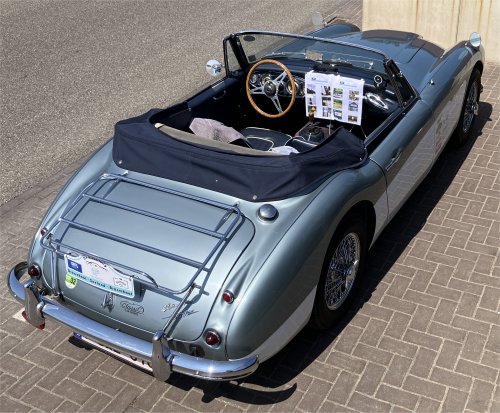
Classic Car on Display
|
There was a single car park up on the sea wall, and a slow crawl of cars wound their way around it, hoping to be in the ideal place to jump into a slot as soon as it was vacated. For some reason many classic cars were part of the crawl. Staring at cars shrunk into insignificance compared to our dire need to top up with liquids. We hiked into town and located an ice cream shop where we enjoyed milk shakes and Tuscany water (surely there is plenty of water in Holland).
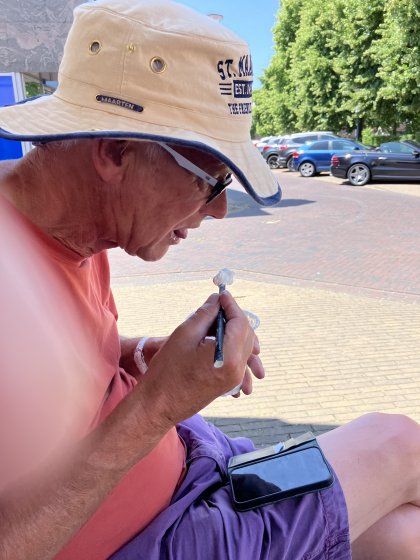
Time for Ice Cream
|
The heat was a show stopper, and we realised it would be madness to hike the 6km back to Wemeldinge. Applying initiative, we located a bus stop, and took a 30-minute break in the shade of church trees until the bus was due.
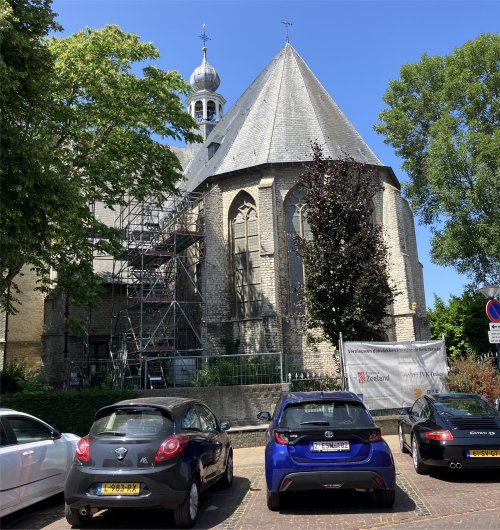
Hervormde Gemeente Yerseke
|
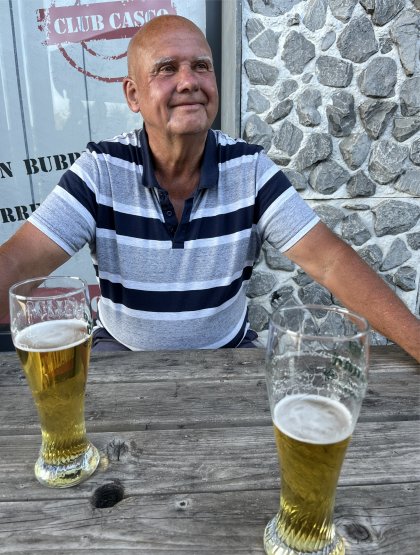
Time for a Beer
|
An elderly couple were waiting at the bus stop when we returned. "We have all the time in the world, so we came to visit Yerseke," the lady told me.
"You must be retired," I replied. Yes, they were retired, indeed the chap had been retired for 13 years. He had been "squeezed out" of the company, but had managed to secure good terms. I could tell he was obviously very happy with the arrangement as he smiled broadly when he told me.
"Now you are retired, you are working for your new boss," Rex joked with the man. The couple both laughed out loud at that comment. I learned they lived somewhere towards Holland's southern border, and had come across to Wemeldinge where they were staying in a hotel.
The bus arrived, and the lady driver was very helpful and patient as she explained that we would have to use contactless payment with our credit cards, stressing not to forget to checkout when we disembarked. As we alighted right by the marina in Wemeldinge, Rex shouted, "Thank you for saving my life!" She laughed. Humour knows no boundaries.
Evening was spent at the same restaurant as the previous evening. Service was slow and not good; indeed, shambolic at one point when a whole trolley cascaded across the restaurant floor. The staff were clueless. I put a wheel back on the trolley and received no thanks at all. C'est la vie.
